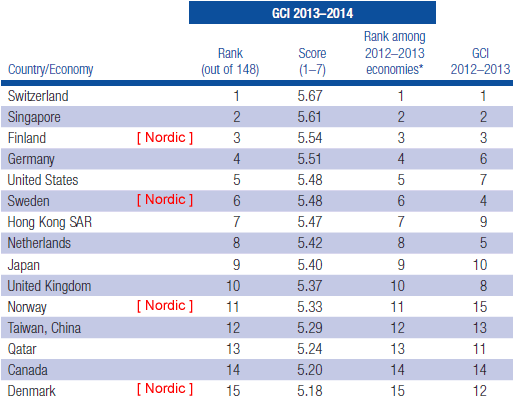Sillypore has witness a surge in corruption cases as the govt ministers paid themselves the highest salaries in the world. Peasants are told the need for highest salaries to avoid corruption & to ensure performance. However when performance are mediocre which doesn't justify the highest political salaries, the leadership rot spreads down the pyramid.
Denmark, Finland & Sweden are cleaner than this tiny island but their govt leaders don't pay themselves stratospheric salaries. These nordic countries have a well-designed welfare state.
Corruption Perceptions Index 2012 Results
The latest corruption is a deputy director of Tan Tock Seng public hospital soliciting a bribe from a company in return for a tender award for a construction project. As peasants know about increasing job insecurity due to trend of outsourcing (previously done inhouse) & trend of 2 year job contracts in govt jobs, what Chang Ha Joon wrote strikes me.
In essence, because there's a well-designed welfare state in those nordic countries
- those nordic citizens are not desperate for $$$ due to job insecurity.
- those nordic citizens are not resistant to retraining & automation as their national economies retool for higher value activities.
Hence Nordic countries economies are competitive as well as the latest Global Competitiveness Index 2013-2014 [8mb report in pdf format] shows:
I'm particularly intrigued by the 2nd point made by Chang Ha Joon. Hordes of Sillyporeans are resistant to changes be it retraining/automation as they are scared of losing their jobs. How to pay absurd 30 year mortgages, high cost of living with no social safety net? Reservist already led to citizens away from jobs, retraining = more time away making citizens more uncompetitive to risk of being fired.
Below is what economist Chang Ha Joon wrote which i've added in subtopic titles:
------------------------------------------------------------------------------------------
New Public Management (NPM), tries to increase administrative efficiency & reduce corruption by introducing more market forces into the government itself through:
- more frequent contracting out.
- a more active use of performance-related pay & short-term contracts.
- a more active exchange of personnel between the public & private sectors.
Jobs previously done inhouse, outsourcing = new opportunities for bribes
Unfortunately, NPM-inspired reforms have often increased, rather than reduced, corruption. Increased contracting out has meant more contracts with the private sector, creating new opportunities for bribes.
Undetected favors
The increased flow of people between the public & private sectors has had an even more insidious effect. Once lucrative private sector employment becomes a possibility, public officials may be tempted to befriend future employers by bending, or even breaking, the rules for them. They may do this even without being paid for it right away.
With no money changing hands, no law has been broken (& therefore, no corruption has occurred) &, at most, the official can be accused of bad judgment. But the payoff is in the future. It may not even be made by the same corporations that benefited from the original decision. Having built up his reputation as a 'pro business' person or even more euphemistically, a 'reformer', he can later move to a plum job with a private law firm, a lobbying organization or even an international agency. He may even use his pro-business credentials to set up a private equity fund.
Job Insecurity. Short-term contract leads to more corruption
The incentive to do favours for the private sector becomes all the greater if the careers of the civil servants are made insecure through short-term contracting in the name of increasing market discipline. If they know that they are not going to stay in the civil service very long, they will have all the more incentive to cultivate their future employment prospects.


On "Undetected favors", the following "The Independent" UK article by Stephen Foley dated Tue 22-Jul-2008 foreshadowed the bail-out fiasco.
ReplyDeletehttp://www.independent.co.uk/news/business/analysis-and-features/how-goldman-sachs-took-over-the-world-873869.html
Here's another:
http://www.thomhartmann.com/blog/2012/11/goldman-sachs-dominationglobal-coup-detat
Or from Youtube:
http://www.youtube.com/watch?v=IJtO_o-G5Jk
Thanks for the links. The 1st consisted of so many names which i didn't expect such numbers.
DeleteI'm put off by the american system with its many lobbies groups funded by corporations. I especially detest the absurd corn subsidies.
Corporations that have grown too big that govt is kinda hostage to it.